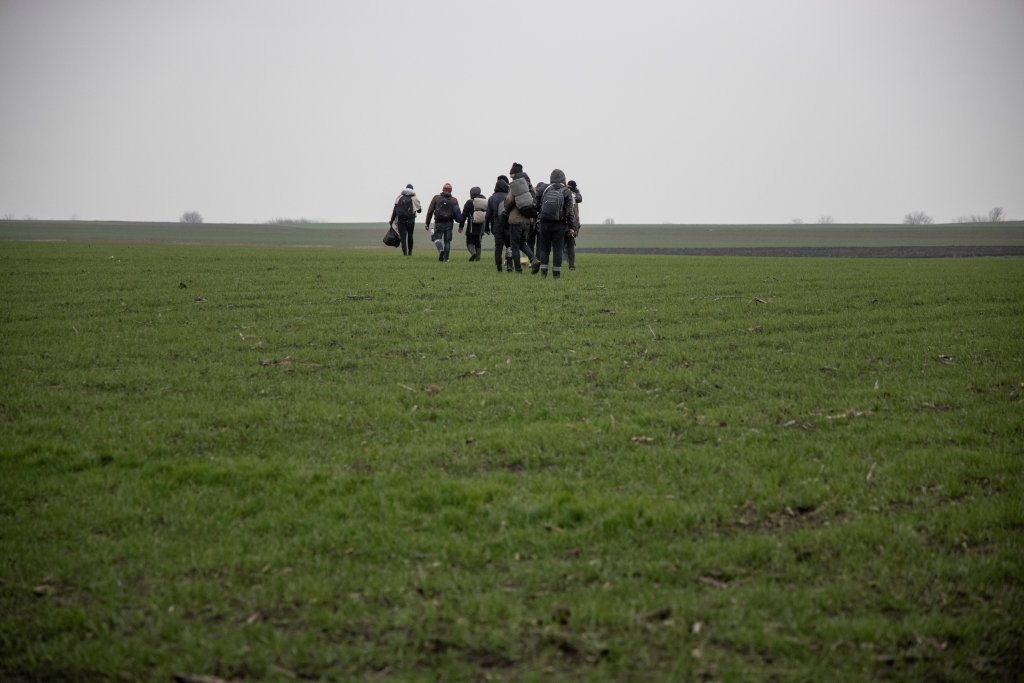
Countries along the Balkan route are stepping up border controls in an attempt to stem irregular migration. An increasing number of migrants have been taking this route since this summer — what accounts for this phenomenon? Several hypotheses exist.
Following a spike in arrivals of migrants along the so-called Balkan route, the countries located along this path are toughening their stance.
Czech authorities this week reintroduced border checks at 27 border crossing points along the entire length of the border with Slovakia. The checks are meant to last at least ten days.
“We have to take this preventive measure to counter the situation for the long-term and discourage illegal migrants from taking this route,” Czech conservative Prime Minister Petr Fiala said at a press conference. The measure is unprecedented since the entry of the two countries into the Schengen Zone in 2007.
From Slovakia, migrants attempt to travel to the Czech Republic to reach other countries of the European Union. Czech authorities have detained around 12,000 persons so far this year, a 12-fold increase from a year ago, according to Reuters.
Further south, Bulgaria has also declared a partial state of emergency on its territory in response to an uptick in irregular border crossings from Turkey.
According to EU border agency Frontex, “the Balkan migration route continues to be the most active in the EU, with 15,900 attempted crossings in August, 141% more than last year.” Frontex specifies that the migrants present along this route generally come from Syria, Afghanistan and Turkey.
What accounts for the surge in migrants using this path? Experts put forward several hypotheses.
Migrants are pushed back at borders but try their luck againContacted on Tuesday (September 27) by InfoMigrants, Frontex replied in the same terms as its press release published in early September: “The high number of illegal border crossings can be attributed to repeated attempts to cross by migrants already present in the Western Balkans.”
Latest from the 🇪🇺 external borders:
In the first seven months of this year, there were about 155 090 irregular entries to the European Union 🇪🇺, 86% more than in the same period of last year.
Read our latest press release ⬇️https://t.co/6tNvUBPjOg pic.twitter.com/wTd5E2XjLR
— Frontex (@Frontex) August 12, 2022Several countries are accused of turning back migrants, especially Hungary (pushing migrants back to Serbia) and Serbia (pushing migrants back to Bosnia and Albania), according to Sophie Duval, advocacy officer at CCFD-Terre.
These arbitrary pushbacks are regularly denounced by the international community, but continue nonetheless. At the end of August, the Council of Europe stated that “the number of forced returns to Serbia has increased considerably, with more than 75,000 cases reported in 2022 alone” and that “allegations of ill-treatment and disproportionate use of force during the pushbacks persist.”
Forced back, many migrants find themselves stranded in Serbia. “There are currently around 28 squats and informal camps in northern Serbia near Hungary and Croatia. This figure may increase with a rise in arrivals to Serbia via North Macedonia. The migrants do not want to stay in Serbia anyway, so they continue their way to the north of the country and try to cross the border several times before they manage to enter Hungary,” explained Vuk Vuckovic, head of the the Serbian NGO Klikaktiv.
Sophie Duval confirms this analysis: “There are a lot of people who have been blocked for years along this route and who are in a situation of wandering because of successive pushbacks.”
Under these conditions, what accounts for the fact that so many people find themselves on the border between Slovakia and the Czech Republic? If they manage to enter Hungary, they can be deported to Serbia but also elsewhere. “Once these people have entered its territory, Hungary has every interest in getting them out of the country. It can therefore turn them back, but it is also safe to bet that Hungary will facilitate the passage of migrants to other countries like Slovakia,” says Duval.
Certain nationalities are exempt from visas
Some nationalities do not need a visa to enter certain Balkan countries. This is the case for Indian, Burundian, Tunisian or Cuban citizens in Serbia. These agreements facilitate access to the Balkan route. Migrants “land in Belgrade and then, through smugglers, cross the border to Hungary, Austria and Switzerland,” said Swiss Justice Minister Karin Keller-Sutter on September 20 during a conference on migration held in Sarajevo.
“Along other routes, policies are more restrictive, especially those put in place by France and other EU countries in terms of granting visas. In this context, migrants are moving to states that allow them to come without a visa, such as Serbia,” says Duval.
Controls are tightened on other routes
The Mediterranean route which dominates the attention of the authorities might also seem less secure for some migrants. Indeed, “the EU is strengthening its cooperation with Libya and agreements are being negotiated for the deployment of Frontex in Morocco, Senegal and Mauritania, which are departure countries for the Canary Islands route,” says Duval.
The war in Ukraine could also explain why the Balkan route has resumed. “There are more controls in Moldova and Romania,” transit countries for migrants, affirms the advocacy officer. “With reinforced controls in this zone because of the war, migrants may be going there less than before,” she says.
Movement resumes after the Covid-19 crisis
For the Swiss Minister of Justice, the migrants on this route are “above all people who were in Turkey and Greece.” However, during the Covid-19 crisis, they were unable to travel due to border closures. “They wanted to go to central Europe but they couldn’t travel,” she said.
“The context of Covid-19 did not help the movement of populations. Today, migration is picking up again, there are multiple passages and the migrants repeatedly test their luck in passing,” says Sophie Duval.
